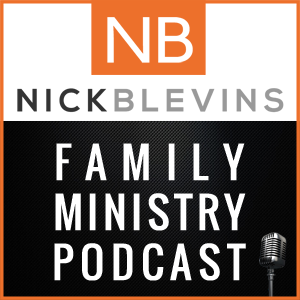In talking about a unified family ministry and the role of a family pastor, the question that often comes up is – What does that look like? The idea of a combined children/student ministry team under one leadership umbrella is still fairly new, so naturally, people want to know how it works practically. When I'm around other family pastors, I too want to know what it looks like for them. One thing I believe helps keep a family ministry team unified is having regular family ministry meetings.
What Our Family Ministry Meetings Look Like
A church's size and structure will determine who is in the meeting and how frequently the meeting happens. But, I believe it's necessary to have some regular rhythm for meeting as a family ministry team. In our church, we do this weekly. I wrote previously about how we use the Top 4 to clarify the purpose of each volunteer role. In that same way, I identified the four primary purposes of our weekly family ministry meeting. Here they are.
Celebrate
One of the reasons we meet regularly as a family ministry team is to celebrate together. We start off each meeting by sharing wins. Where did we “win” in ministry recently? What story needs to be shared? What volunteer stepped up in a big way? What kid or student took a step of faith? Who on the team can we brag on because we saw something great they did? Sharing wins helps keep the vision fresh, but sharing them all together also helps us feel invested in each other's ministry.
Accountability
We are held accountable for some specific things at our family ministry meeting. This part of the meeting is very brief, but by doing this as a team there's some shared accountability as Patrick Lencioni writes about in the 5 Dysfunctions of a Team. We are held accountable for feedback reports, follow up, and anything we assign at the meeting.
Learn
We use this meeting as an opportunity to learn together as well. Sometimes we read books together and discuss them. Other times we listen to podcasts on our own and then talk about them at the meeting. As I write this I have a blog post saved for our team to read and discuss together at our next meeting. The secret to leading a growing family ministry is habitual learning and our meeting helps make it a priority.
Collaborate
The last thing we do in our meeting is collaborate. There will be various projects or events we work on together, and our meeting is a time to touch base. Bigger projects and events get their own meetings, but even then the conversation starts in our family ministry meeting. For instance, the last thing we collaborated on was re-defining our plan for helping parents through each phase with the classes, seminars and groups we offer (see Just a Phase).
Our Meeting Code: The Big 3 + 1
At our church, we have a “meeting code”. It's a set of agreements, really, about how we will conduct meetings and we call it the Big 3 + 1.
Honor the task at hand
When we're meeting, we all agree to honor the task at hand. This means we talk about the specific topic we should be talking about and we don't go down rabbit trails or have side conversations. Do we do that at times? Absolutely. But, having this principle means it's not the norm and we can easily get everyone on the same page if it does happen. This also means we don't use our cell phones or computers in meetings. Some of us do use tablets, and everyone knows not to get distracted by them with emails or Angry Birds.
Listen as an ally
Listen as an ally means we actively listen to whoever is speaking and think in terms of how we can support them. It's easy to start forming counter arguments before someone is finished talking, and we avoid that if we're listening as an ally. This also means we don't interrupt each other, which is really easy to do and some people have a harder time with it than others.
Silence means agreement
We believe our best ideas and plans will only come if every team member has a voice in the discussions. So, if someone is silent, we take that to mean they agree. There will be plenty of times when everyone doesn't agree (if not, something's wrong), and in those times we don't talk to other people outside of the meeting about it. Unity must be fought for.
+1 – Being on time means be early
Being on time for a meeting in our culture means you're early and you're prepared. We don't roll into meetings at 1 minute after or start printing documents for the meeting when it's supposed to begin. This could apply to a bunch of areas but it's part of our meeting culture.
The Big 3 + 1 help define our meeting culture. I hope they can be helpful to you as you define the culture of your meetings.
What does your meeting look like?
Regardless of what meetings you lead, I think it can be helpful to clarify the main reasons for the meeting to make sure you stay focused. The last thing anyone wants is unnecessary meetings.







How many people typically are at your weekly meetings? Do you have them during the days or in the evening? Are the people in the meeting all staff or volunteers or both. Thanks for everything you do to help children’s ministry leaders!
Hey Mike,
Great questions. Ours is 5 people and it’s all staff and during the day. I think they would need to look different based on size of church and size of the team. This is by no means exact, but for churches 0-500 in size I’d look at monthly on a weeknight or off-hours so volunteers could be in it. Churches 500-3000 are mostly staff and could be weekly during the day. 3000+ or multisite could mean monthly during the day and the reason it’s monthly is because the teams are so big and/or so spread out.